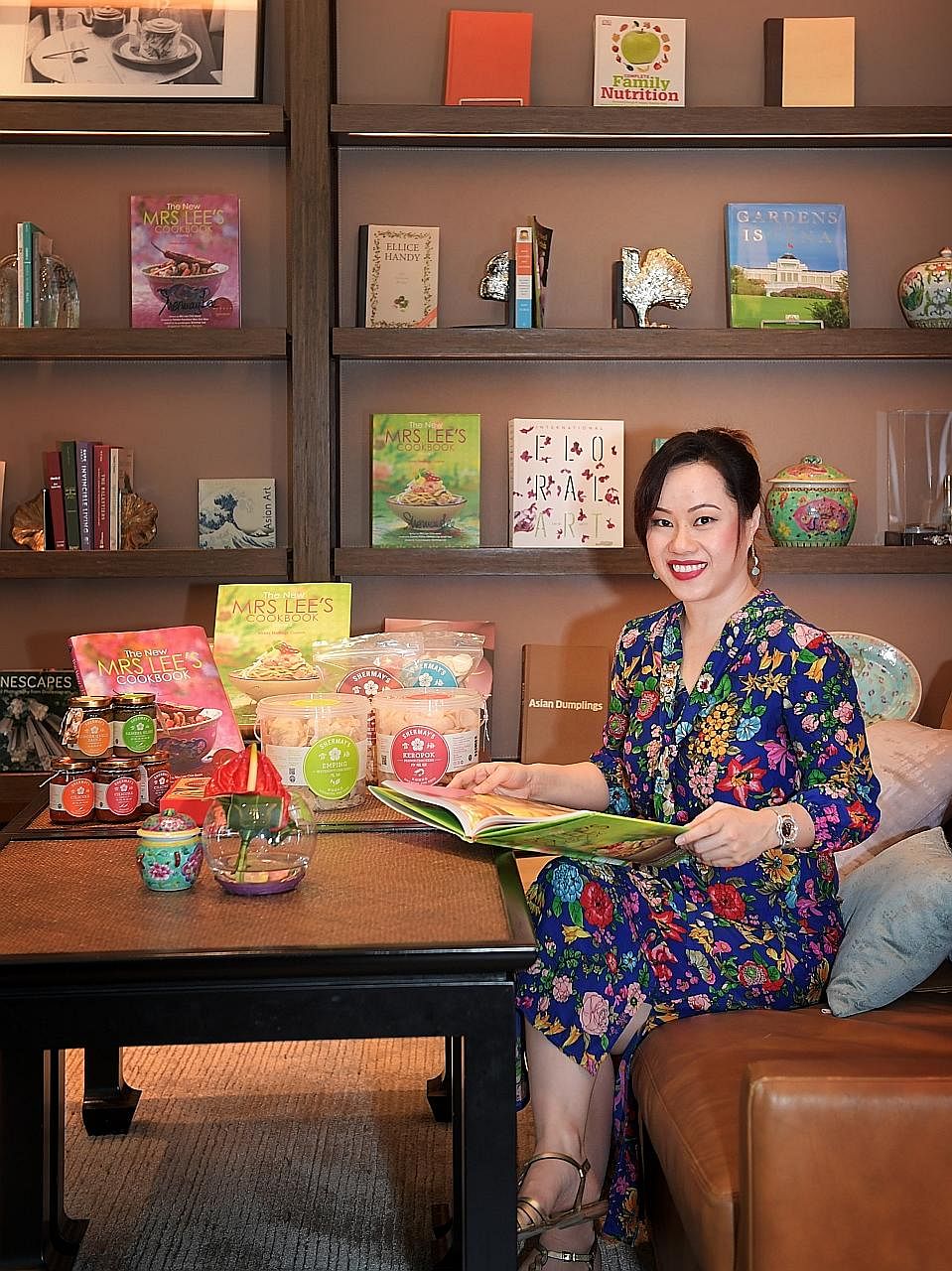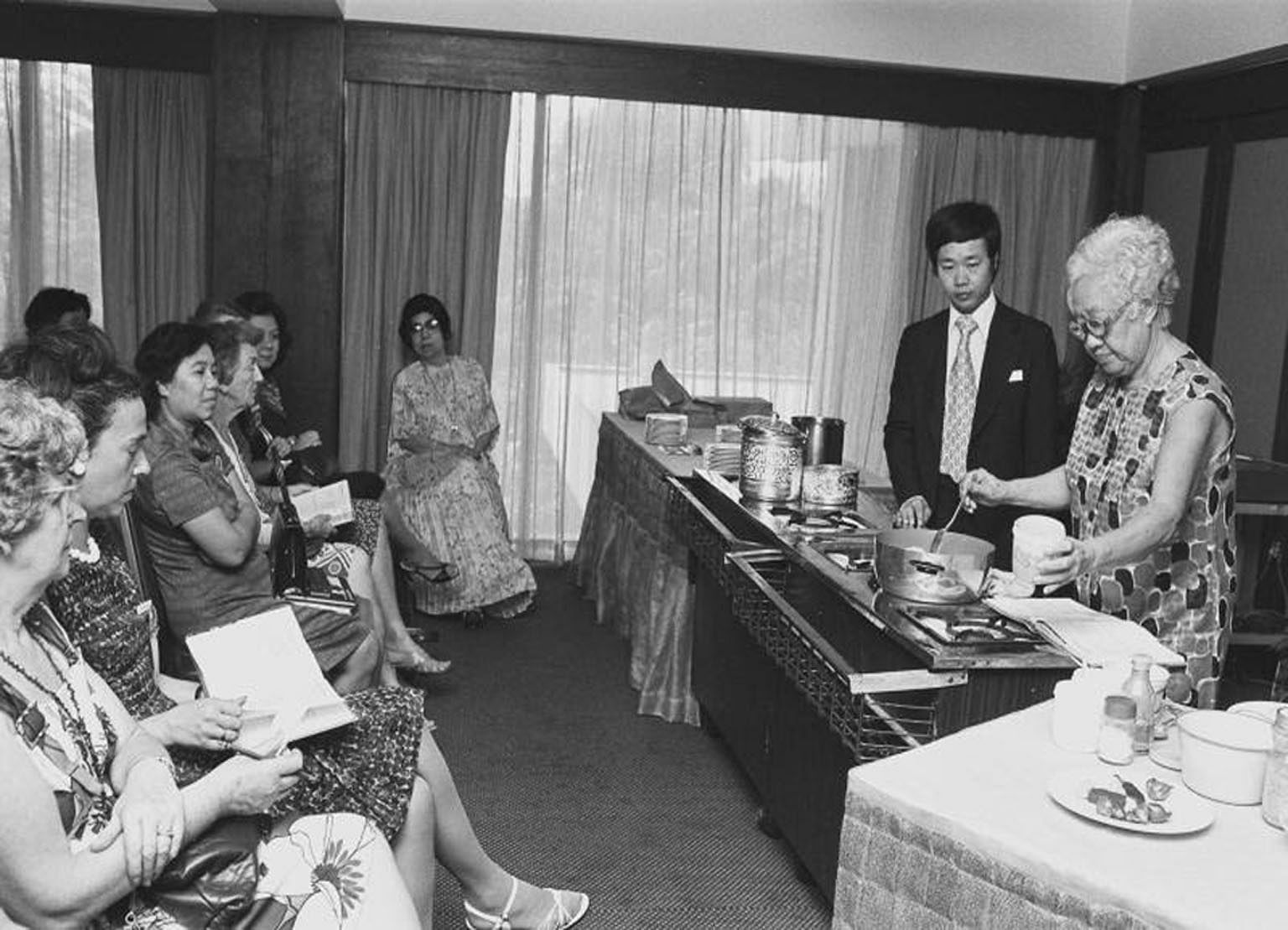It Changed My Life: Just doing what tastes right
Ex-investment banker explores mysteries of food science to grow grandma's culinary legacy
Sign up now: Get ST's newsletters delivered to your inbox
Former banker Shermay Lee decided to honour her Peranakan heritage by updating her grandmother's famous Mrs Lee's Cookbook and opening a cooking school. Now, she has turned the recipes into her own range of food products.
These are extraordinary times, and Shermay Lee feels she has to step up and lend a helping hand to those in the food community reeling from the Covid-19 pandemic.
The cookbook author, food consultant and founder of Shermay's Singapore Fine Food has decided to turn her Shermay.com website into an umbrella offering shelter to small food crafters.
Instead of just peddling her own line of sauces, marinade, crackers and curry powder, it now allows shoppers to buy across different brands, including A.muse Projects tea, Straits Preserves and Batu Lesung spice mixes and pastes.
Many local food crafters, she says, have been severely affected during this period of circuit breaker and social distancing with department stores closed and farmers' markets, pop-ups and food events cancelled.
"We must help each other survive this. It's about all of us," says Ms Lee, who is not just waiving product listing and delivery charges but even offering free warehouse space.
"Our struggle is less visible than restaurants', we are at factories and warehouses," she says of the Singaporean-owned or -made brands she is helping. "When you shop here, the proceeds go directly to the food crafters and the ecosystem that they support."
Playing big sister to fellow food artisans is a measure of how far the forty-something has come in her professional culinary journey.
Ms Lee popped up on the scene 17 years ago, a vivacious Ivy League graduate who gave up a high-flying career as an investment banker to preserve her grandmother's legacy.
Her paternal grandmother is the late Mrs Lee Chin Koon, a doyenne of Peranakan cooking and author of the iconic Mrs Lee's Cookbook.
Ms Lee started by updating, very successfully, the grande dame's 1974 kitchen bible in two volumes: The New Mrs Lee's Cookbook, Vol. 1 and Vol. 2.
She then opened Shermay's Cooking School, which became the go-to venue for food enthusiasts to learn not just Peranakan cooking but everything from fermentation methods to Asian breads.

Ms Shermay Lee, founder of Shermay's Singapore Fine Food, has parlayed her Peranakan cooking skills and heritage recipes like those of her grandmother's into food consulting and manufacturing.
ST PHOTO: ALPHONSUS CHERN
Today, she is a sought-after food consultant and food manufacturer with her own sauces, marinade, curry powder and crackers based on her grandmother's, as well as her own, recipes.
It's not just about preserving Grandma's legacy any more; it's about promoting it and expanding it in the digital age.
Bubbly and chatty, Ms Lee says she has fond memories of Mrs Lee, who had five children, the eldest of whom was Singapore's founding prime minister Lee Kuan Yew.
"She was an amazing woman, one of those who used their skills to feed their families and educate their children," says the food entrepreneur, whose father is physician Lee Suan Yew, and mother Pamelia Lee, a tourism-industry veteran.
The second of four children, she was only five when her grandmother, who babysat her, died.
"But I remember being nurtured and doted on by her. She'd take me along when she went to Tekka Market a few times a week. She also read me Archie comics. I have a very strong memory of being in the kitchen with her; it was a very positive place."
Her culinary instincts, however, were largely dormant in her formative years.
"I was supposed to study. 'Don't waste time in the kitchen', I was told," says the former student of Methodist Girls' School and United World College.
She focused on the same goals shared by many of her peers: Get into a good university and land a high-paying job in law or banking.
At Brown University in Rhode Island in the United States, she studied history and political science.
Being away from home sent her scurrying into the kitchen for the first time, cooking dishes like laksa, simply by using a pre-packaged laksa paste.
"I was desperate. My complicated South-east Asian palate was eating East Coast institutional (Asian) food which was quite vile. The rice was wrong, the stir-fry was wrong, everything was wrong."
After graduating in 1997, she came home and became an equity researcher at Morgan Stanley. By then, she was interested enough in cooking to want to learn how to do it properly.
A year later, she quit and hightailed it to London's Le Cordon Bleu culinary school where she spent nine months pursuing a Grand Diplome, a comprehensive programme covering classic French culinary techniques as well as pastry-making.
She learnt a lot from the "pivotal" experience - "the French system is very exacting" - but it did not galvanise her to pursue a culinary career immediately.
Instead, investment banking in Hong Kong beckoned.
"My first year in research didn't suit me because I found it mundane and slow. But I was doing mergers and acquisitions in Hong Kong, which was more fast-paced and more deal-driven," says Ms Lee, who spent nearly five years in the former British colony working first for Schroders, and then UBS.
To de-stress, she cooked a lot in her tiny apartment in the Mid-Levels, whipping up whatever was on trend at that time.
"I remember roasting chickens in an Iona convection oven, which I had to put on the floor."
In 2002, she asked for a transfer to the UBS Singapore office, and six months later, called it quits.
"It was time to do something different, sustainable and enjoyable," she recalls, laughing.
Updating her grandma's kitchen classic was something she had been thinking about for several reasons.
It had been out of print for a while, and although comprehensive, the volume had "black and white text and very few photos".
"You have to know how to cook in order to navigate it. I realised that people need something more step-by-step and more dummy-proof," she says, adding that she wanted to honour Mrs Lee's memory with something outstanding.
She likens the whole project - published by Marshall Cavendish - to a good facelift.
"If it's a good facelift, you look like yourself but a lot better. I did reduce some sugar and salt because I think our palates have significantly changed, but I was very deliberate and mindful about these changes."
"I did not want to change the essence of the recipes because that would be irresponsible and a dilution of originality," says Ms Lee, who slaved over and oversaw all aspects of the production, from cooking the dishes to photography and design.
"I tried to recapture her flavours using my father's and my cousins' taste buds. It's a faithful preservation of recipes," she says, adding that she used her savings to pay for the book's publication.

The New Mrs Lee's Cookbook Vol. 1 was a big hit when it was released in 2003; ditto the second volume, which came out the following year.
There have been several small reprints over the years, but last September, the two volumes had a major re-release under new publisher World Scientific Publishing.
Shermay's Cooking School, located in Holland Village, was her next project in 2003.
She started off teaching students how to make Peranakan dishes, including mee siam and popiah, from scratch. She later roped in other experienced instructors, whom she handpicked herself, to conduct a wide variety of courses ranging from Japanese chiffon cheesecake to French heritage dishes.
Well-known chefs such as Julien Royer (Odette) and Patrick Heuberger (atout) gave workshops too.
Although it did well, she decided to call it a day in 2015.
"I was starting to feel more like a talent manager," she says.
Singaporeans, she says, have also become harder to please because they are so well travelled.
"The (culinary) gap between the school and our customers had become smaller. You can learn so much online and from YouTube videos. Just go on Instagram; people today are posting pictures of their own sourdough starters and kombucha fermentations," she says, referring to the fizzy fermented tea.
More importantly, she felt it was time for her to parlay her skills and heritage recipes like her grandmother's into something more scaleable.
"I felt I wasn't exploring my full capability. I wanted new challenges, I wanted to stretch myself," says Ms Lee, who had by then come into her own as a respected authority on Peranakan cuisine.
Her strategy to widen the reach of her ideas was two-pronged: food consulting and food manufacturing.
"I used to teach people how to make mee siam from scratch, and I can teach maybe 12 people in a class, but what if I get a kitchen to cook it? Then I reach hundreds of people."
The Fullerton Bay Hotel was one of her earliest clients. Among other projects, the hotel asked her to curate a special menu featuring dishes by "Singapore's Culinary Grande Dames": her grandmother, her grand-aunt Leong Yee Soo and her former school principal Ellice Handy.
Since then, she has collaborated with many establishments, including The Tanglin Club as well as Shangri-La Hotel, which recently ran a Grandma's Kitchen Buffet featuring Peranakan dishes.
One of her proudest projects was with Singapore Airlines in 2015.
"My grandmother's recipes were going global because the dishes were served on SIA's flights - from first class to economy - and in their lounge," she says, looking chuffed.
Walking into the massive Sats kitchen in Changi and seeing people beavering away preparing meals from a menu she had curated was one of the most defining moments in her life, she says.
She launched Shermay's Singapore Fine Food with several versions of a meat marinade and cilicuka - a chilli and vinegar sauce based on her grandmother's recipe - towards the end of 2014.
It was the start of a new learning curve. To prepare for it, she attended, among other things, a two-day food-packing course at Singapore Polytechnic.
"I learnt all about packing materials - foil, nylon - and the packing process - top filling, glass jar, sealing, integrating - things I never knew before."
Food manufacturing is fascinating, she says enthusiastically.
"Food science is alchemy, it's reverse engineering, it's a mystery," says Ms Lee, who also attended workshops on packaging design at DesignSingapore.
But she is adamant about one thing: product integrity.
"They have to be close to the recipes and be high in actual vegetable content," she says, adding that she steers clear of artificial colouring and flavouring, and monosodium glutamate in her products.
Her product range has expanded and now includes keropok (prawn crackers) and sambal hijau, a green chilli sauce from one of her own recipes, and curry powder. Manufactured at different factories, they are available at Tangs, and online at Shermay.com, RedMart and Amazon.
She is excited about the plans - more products, sustainable packaging and strategic partnerships - in her head.
Hers is not a huge operation, which is fine by her at this stage.
"I want it to be sustainable and profitable. I also want to have control over the brand and enjoy the process. It's not about having more, it's about doing things and doing them well and growing the market."
This is the second of a four-part Audemars Piguet series on trailblazers who value both tradition and innovation in a changing world


